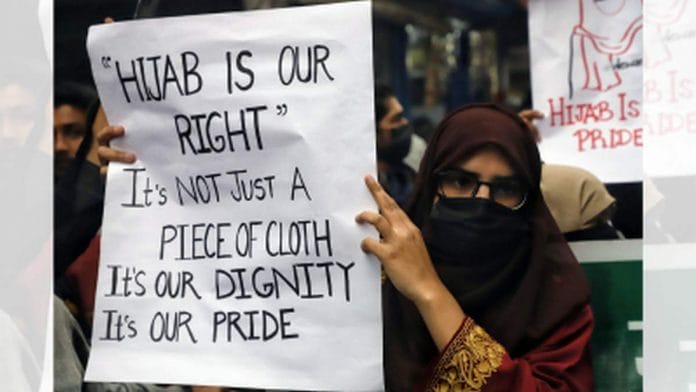New Delhi: A three-judge bench of the Karnataka High Court Friday reserved its verdict on petitions questioning the hijab ban for Muslim girls at the Udupi Government Pre-university (PU) College as well as on a 5 February state government order that extended its support to the restriction.
Led by Chief Justice Ritu Raj Awasthi, the bench, also comprising justices Krishna S. Dixit and J.M. Khazi, heard the matter for 11 days.
Its interim order of 11 February, which restrains all students from wearing religious clothing in colleges where a dress code is in force, will remain in operation till the judgment is pronounced.
The hearing in the case witnessed the formulation of crucial questions related to constitutional rights, including that under Article 25 (freedom of conscience, faith and religion), Article 19 (right to free speech and expression), and the extent to which the state can impose fetters on the two fundamental rights.
The Karnataka government, the college and the petitioners have all put forward their arguments in the case before the three-judge bench.
During the hearing Friday, the bench heard rebuttal arguments from the petitioners in support of the hijab, who reiterated that it was a “bona fide practice of conscience”.
Also read: Proud Muslims or radical Islamists? Why PFI is linked to everything from hijab row to terror plots
‘Essential religious practice,’ say petitioners
The hijab, the petitioners have claimed, is an “essential religious practice” under Islamic law and, thus, is a constitutionally-protected right.
In the second part of their argument, the petitioners asserted that wearing of hijab is also a fundamental right under Article 19, on which “reasonable restrictions” can be imposed.
However, the restriction on hijab cannot be construed as “reasonable”, the petitioners told the court.
In their view, the 5 February government order violates the petitioners’ fundamental right to live with dignity. They argued that fundamental rights can be curtailed to achieve three objectives — public order, health and morality.
But the government order, they argued, was silent on all the three aspects and, therefore, the state had failed to establish the objective behind putting curbs on wearing the hijab.
As a result, the order should be quashed, the petitioners argued.
They even raised doubts about the validity of the College Development Committee (CDC), which prescribed the uniform, including the hijab ban.
The court was told that the CDC was not empowered under the Karnataka Education Act to frame such rules and such a delegation of power to the committee was illegal.
Views of the state, college, CDC
On its part, the state denied it had anything to do with the framing of the uniform/dress code guidelines and said this authority was vested with the college administration.
But it supported the college’s decision to ban the hijab, it stated, as it was not an essential part of religious practice.
The state also drew comparison to the 2018 Supreme Court judgment in the Sabarimala case to argue that the hijab does not stand the test of constitutional morality and individual dignity, the two concepts that were laid down in the said SC verdict.
The college management, too, defended its order with an assertion that uniforms had always been there in the college since 2004 and never came under question till last December, when a handful of students made it an issue.
They argued that the controversy was escalated further at the instigation of the Campus Front of India (CFI), the student wing of the Islamic organisation Popular Front of India (PFI).
Even the college’s CDC committee justified not permitting hijab in the classroom.
Its counsel claimed that students were allowed to wear the hijab within the school premises and were told to remove it only when they were in the classroom.
Both the state and the college rejected the petitioners’ argument that the order violated their fundamental right to live with dignity, maintaining that the hijab ban is only restricted to colleges and not the entire state.
‘Bona fide practice of conscience’
During the rebuttal arguments from the petitioners in support of the hijab, it was reasoned that the hijab was not to cover the face but head, rejecting the state’s contention that the headscarf is a regressive practice.
The college’s authority to prevent students from wearing the headscarf was also questioned, with the petitioners claiming that the hijab was a “bona fide practice of conscience”.
Quoting the SC judgment in the Ayodhya case, the petitioners cautioned the court from engaging in “theological discussions” and advised it to only see if the faith and belief of the worshipper is genuinely upheld.
(Edited by Saikat Niyogi)
Also read: Hijab row shows we are moving backwards. This isn’t the Karnataka I studied in






